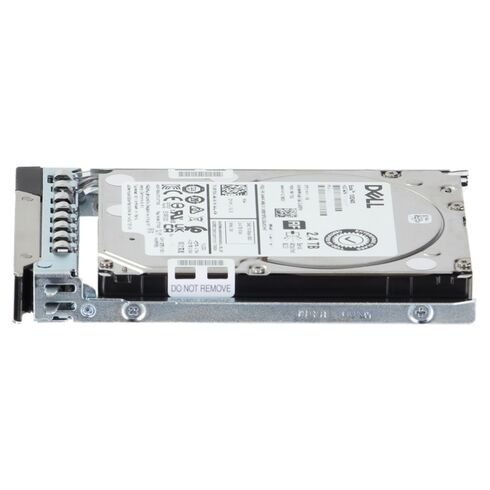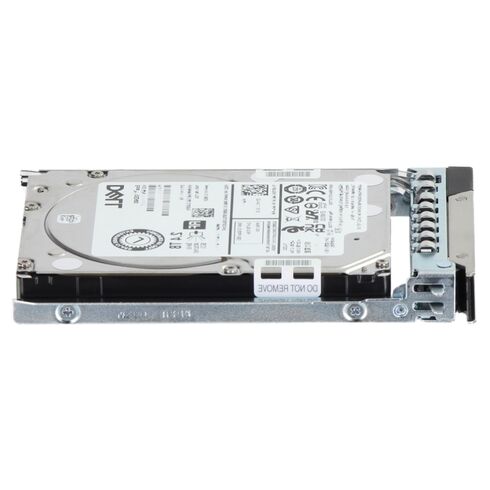400-AXCS Dell 2.4TB 10K RPM SAS-12GBPS SFF Hard Disk
- — Free Ground Shipping
- — Min. 6-month Replacement Warranty
- — Genuine/Authentic Products
- — Easy Return and Exchange
- — Different Payment Methods
- — Best Price
- — We Guarantee Price Matching
- — Tax-Exempt Facilities
- — 24/7 Live Chat, Phone Support
- — Visa, MasterCard, Discover, and Amex
- — JCB, Diners Club, UnionPay
- — PayPal, ACH/Bank Transfer (11% Off)
- — Apple Pay, Amazon Pay, Google Pay
- — Buy Now, Pay Later - Affirm, Afterpay
- — GOV/EDU/Institutions PO's Accepted
- — Invoices
- — Deliver Anywhere
- — Express Delivery in the USA and Worldwide
- — Ship to -APO -FPO
- — For USA - Free Ground Shipping
- — Worldwide - from $30
Overview of DELL Hard Disk Drive
Product Specifications
- Manufacturer: DELL
- Model Number: 10n35
- Part ID: 400-AXCS
- Type: Internal Hard Disk Drive
Technical Details
Storage Capacity and Dimensions
- Total Capacity: 2.4 Terabytes
- Form Factor: 2.5 Inches
Interface and Performance
- Connection Type: SAS 12 Gb/s
- Cache Memory: 256 Megabytes
- Sector Size: 512e
Performance Metrics
Speed Specifications
- Rotational Speed: 10,000 RPM
- Average Latency: 2.9 milliseconds
- Sustained Transfer Rate: 270 to 117 Mb/s (from outer to inner diameter)
- Cache Multisegmented: 256 MB
- External Transfer Rate: 1200 Mbps
Advanced Caching Capabilities
Optimization Features
- I/O Acceleration: Enabled for enhanced response times
- NAND Flash Type: EMLC
- NAND Flash Size: 16 GB
- Intelligent NAND Endurance Management: Yes
Expansion and Connectivity Options
Interfaces and Compatibility
- SAS Interfaces: 1 x 12 Gb/s
- Compatible Bays: 1 x Hot-swap - 2.5 Inches
System Compatibility
Supported Server Models
- POWEREDGE R740xd
- POWEREDGE R7425
Capacity
The Dell 2.4TB Hard Disk is a powerful storage solution that boasts an impressive capacity of 2.4TB. This massive storage space allows users to store a vast amount of data, making it ideal for businesses and individuals who deal with large files and data-intensive applications.
Benefits of 2.4TB Capacity
Ample Storage Space
With 2.4TB of storage capacity, users can store a significant amount of data without worrying about running out of space. This is particularly beneficial for businesses that deal with large datasets, such as media production companies, research institutions, and data centers. It provides the flexibility to store and access a wide range of files, including documents, images, videos, and databases.
Improved Efficiency
Having ample storage space means that users do not have to constantly manage their storage or delete files to free up space. This allows for improved productivity and efficiency as users can focus on their work without interruptions or delays caused by storage limitations. Additionally, the large capacity enables users to keep multiple backups and versions of their files, providing an added layer of security and peace of mind.
Scalability
The 2.4TB capacity of the Dell Hard Disk offers scalability options for businesses and individuals. As data needs grow over time, the ability to expand storage capacity becomes crucial. With this hard disk, users have the flexibility to upgrade their storage without replacing the entire system. This scalability feature ensures that users can adapt to changing storage requirements in a cost-effective manner.
Reduced Need for External Storage
The 2.4TB capacity eliminates or reduces the need for external storage devices such as external hard drives or cloud storage subscriptions. This not only saves money but also simplifies data management by centralizing all files on a single device. Users can access their data directly from the Dell Hard Disk, eliminating the need for an internet connection or relying on third-party cloud services.
Importance of 2.4TB Capacity
The importance of the 2.4TB capacity lies in its ability to meet the growing demands of storage-intensive applications and data-driven businesses. As technology advances and data continues to grow exponentially, having a robust storage solution becomes crucial for handling large volumes of data efficiently. The 2.4TB capacity offered by the Dell Hard Disk ensures that users can store, access, and manage their data without any limitations, ultimately enhancing productivity and facilitating seamless operations.
Speed
The Dell 2.4TB Hard Disk is designed to deliver exceptional speed with its 10K RPM (Rotations Per Minute) performance. This high rotational speed ensures fast data access and transfer rates, making it an ideal choice for users who require quick and efficient storage solutions.
Benefits of 10K RPM Speed
Faster Data Access
The 10K RPM speed of the Dell Hard Disk enables faster data access, reducing the time it takes to retrieve information from the disk. This is particularly important for applications that require quick response times, such as databases, virtualization, and high-performance computing. Users can experience improved system responsiveness and reduced latency, leading to enhanced productivity and smoother workflow.
Enhanced Performance
The high rotational speed of 10K RPM translates into improved overall system performance. It allows for faster boot times, quicker application launches, and seamless multitasking. Whether it's running resource-intensive software or handling complex calculations, the speed offered by this hard disk ensures that users can work efficiently without experiencing sluggishness or delays.
Efficient Data Transfer
The 10K RPM speed plays a crucial role in facilitating efficient data transfer rates. It enables faster read and write operations, which are essential for tasks such as data backup, file synchronization, and data replication. Users can transfer large files or perform data-intensive operations more quickly, saving valuable time and improving productivity.
Importance of 10K RPM Speed
The importance of the 10K RPM speed lies in its ability to meet the demanding requirements of modern computing environments. As applications become more resource-intensive and data volumes continue to grow, having a storage solution that can keep up with these demands becomes essential. The high speed offered by the Dell Hard Disk ensures that users can experience optimal performance, improved efficiency, and seamless data transfer, ultimately enhancing their overall computing experience.
Interface
The Dell 2.4TB Hard Disk features a SAS-12GBPS interface, providing users with a reliable and high-speed connection between the hard disk and the host system. The SAS (Serial Attached SCSI) interface offers several benefits and is widely used in enterprise-level storage solutions.
Benefits of SAS-12GBPS Interface
High Data Transfer Rates
The SAS-12GBPS interface delivers exceptional data transfer rates, allowing for quick and efficient exchange of data between the hard disk and the host system. This is especially important for applications that require fast access to large datasets or handle real-time data processing. Users can experience reduced waiting times and improved system responsiveness, resulting in enhanced productivity.
Reliability and Scalability
The SAS interface is known for its reliability, making it an ideal choice for mission-critical applications. It offers robust error detection and correction mechanisms, ensuring the integrity of data during transmission. Additionally, the SAS-12GBPS interface provides scalability options, allowing users to connect multiple hard disks in a daisy-chain configuration, thereby expanding storage capacity without sacrificing performance.
Compatibility
The SAS-12GBPS interface offers backward compatibility with previous SAS generations and also supports SATA (Serial ATA) drives. This ensures compatibility with a wide range of systems, making it easier for users to integrate the Dell Hard Disk into their existing infrastructure. The versatility of the SAS interface allows for seamless integration and hassle-free deployment.
Importance of SAS-12GBPS Interface
The importance of the SAS-12GBPS interface lies in its ability to provide users with a reliable, high-speed, and versatile connection. In enterprise-level environments where data integrity and performance are critical, having a robust interface becomes paramount. The SAS-12GBPS interface offered by the Dell Hard Disk ensures that users can experience fast data transfer rates, scalability options, and seamless compatibility, ultimately enhancing their storage infrastructure and enabling efficient data management.
Form Factor
The Dell 2.4TB Hard Disk features a Small Form Factor (SFF), which refers to its compact physical size. The SFF design offers several advantages in terms of space utilization, flexibility, and compatibility.
Benefits of SFF
Space Efficiency
The SFF design allows for optimal space utilization within the host system. It is smaller in size compared to larger form factors such as 3.5-inch drives, making it suitable for environments where space is limited. This is particularly beneficial for small businesses, home offices, and compact systems where every inch of space matters.
Flexibility and Compatibility
The compact size of the SFF form factor enables greater flexibility in terms of system design and configuration. It allows for more efficient cooling solutions and facilitates better airflow within the system. Additionally, the SFF design is compatible with a wide range of drive bays and mounting options, ensuring compatibility with various systems and enclosures.
Energy Efficiency
The smaller physical size of the SFF hard disk translates into lower power consumption. This contributes to overall energy efficiency, reducing the operational costs associated with running the system. Users can benefit from reduced electricity bills and a greener computing environment without compromising on performance or storage capacity.
Importance of SFF
The importance of the SFF form factor lies in its ability to address the space constraints of modern computing environments. With the increasing trend towards compact systems and the need for efficient use of space, having a small form factor becomes essential. The SFF design offered by the Dell Hard Disk ensures that users can maximize their storage capacity within limited space, maintain system flexibility, and achieve energy efficiency, ultimately enhancing their overall computing experience.













